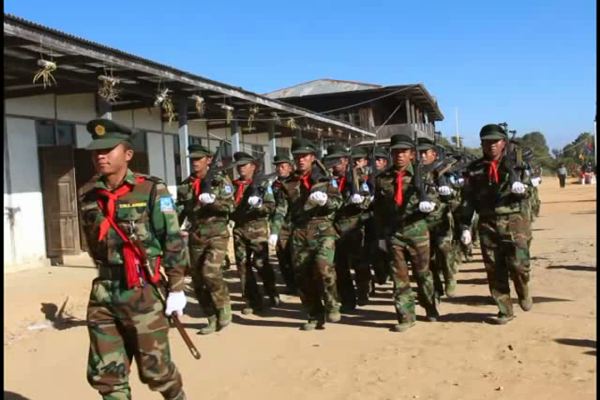As the second stage in Burma’s lurching peace process began with the Union Peace Conference in Naypyidaw on Tuesday, the absent Ta’ang National Liberation Army marked its 53rd Revolutionary Day with skirmishes against Burmese troops.
Fighting in the Kutkai area of northern Shan State broke out on the afternoon of 12 January between the group’s 447/335 Regiment and the Burmese army’s 99th Light Infantry Division, according to a spokesperson for the TNLA.
The fighting occurred in the same area of TNLA 5th brigade held territory where the ceremony for Ta’ang Revolutionary Day was held. Gun battles were also reported by the militia group in the area of Namtu Township on the same day.
“This year, each brigade had its own Revolutionary Day celebration, numbers one, two, three and five,” confirmed TNLA spokesperson Mai Aik Kyaw.
The TNLA is closely allied to the Myanmar Nationalities Democratic Alliance Army (MNDAA) and the Arakan Army (AA). The trio fought a bloody war in the Kokang region of northeastern Shan State just under one year ago. The fighting led to the government’s expulsion of the TNLA, MNDAA and AA from the peace process, in a move that shattered progress towards a fully inclusive nationwide ceasefire.
The TNLA has continued Shan State battles with the Burmese army in the months since the October signing of the deal dubbed the Nationwide Ceasefire Agreement (NCA). The group has also fought fellow ethnic rebels the Shan State Army-South, which signed the ceasefire despite not taking part in its drafting.
“We were involved in the drafting of the NCA. We joined all the meetings. The NCA was acceptable to us as of our last negotiations. We were ready to sign if all the groups were to sign, but the government left us out. They signed only with eight ethnic groups, Mai Aik Kyaw told DVB by telephone.
“Then, they drafted the framework for political dialogue framework by themselves. They had continued discussions. We cannot accept the work done after the signing of the NCA. The current union conference is not meaningful as it is not inclusive. We cannot call it a peace conference.”
In October, the larger and more powerful Kachin Independence Army (KIA) and Shan State Army-North were among seven armies that refused to sign the pre-drafted NCA, on the grounds that it was exclusionary.
The bloc, under the banner of the United Nationalities Federal Council, has too boycotted the Union Peace Conference now underway in Naypyidaw.
[related]
“A truly nationwide ceasefire should include the will of everybody. It is crucial that there is no discrimination between the groups that signed and the groups that didn’t, there should be a way for everyone to be involved in discussions,” said Dau Khar of the Kachin Independence Organisation, the political wing of the KIA.
“But, the groups that did not sign the agreement were not included in the drafting of the framework for the current discussions.”
Dau Khar went on to say that Aung San Suu Kyi’s National League for Democracy (NLD), which will take control of the peace process along with the reigns of government in April, will struggle to unite the disparate and warring armies.
“It will be impossible, even for the NLD, to implement peace with such discrimination. The NLD will also struggle to engage without the blessing of the military,” he said.



